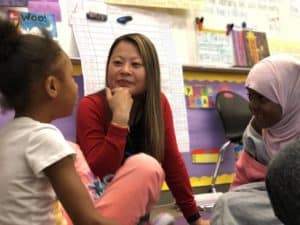By League of Education Voters Policy Team
 Students learn most effectively when their school feels safe, inclusive, supportive, and respectful. (1)
Students learn most effectively when their school feels safe, inclusive, supportive, and respectful. (1)
Closing opportunity and achievement gaps and improving student outcomes relies on our ability to create positive school climates for every student.
Opportunity:
Creating positive school climates and providing student supports can mitigate the impact of trauma (2), mental health needs (3), and other non-academic factors that affect a student’s ability to engage in learning (4). Washington state has embarked upon some critical work to create positive school climates. The Educational Opportunity Gap Oversight and Accountability Committee (EOGOAC) spearheaded a number of reforms, most recently with the passage of HB 1541 that continued student discipline reform and created the Washington Integrated Student Supports Protocol (5). The state also convened a workgroup to develop benchmarks for Social-Emotional Learning (6) for district use. We can enhance these and other efforts to deliver services to students and enable districts and schools to create welcoming and supportive environments for every student.
Solution:
We must ensure that our schools are set up to provide supports and services to meet students’ needs. All school staff need training to address trauma and support social-emotional learning. Students should also have consistent access to services through in-school support staff, such as social workers, nurses, counselors, and mental health professionals, or through community partners.
1. US Department of Education, “Guiding Principles: A Resource Guide for Improving School Climate and Discipline”
2. Trauma and Learning Policy Institute: https://traumasensitiveschools.org/trauma-and-learning/the-problem-impact/
3. University of Maryland, Center for School Mental Health Analysis and Action. “Education and Systems of Care Approaches: Solutions for Educators and School Mental Health Professionals.” (2007)
4. ChildTrends, “Making the Grade: A Progress Report and Next Steps for Integrated Student Supports.” (2017)
5. Center for Improving Student Learning, OSPI. “Washington Integrated Student Supports Protocol”
6. Washington Social Emotional Learning Benchmark Workgroup Report
Additional Resources:
Washington Integrated Student Supports Protocol
Washington Social Emotional Learning Indicators Workgroup
National Center on Safe Supportive Learning Environment
Collaborative for Academic, Social, and Emotional Learning
Durlak, J. A., Weissberg, R. P., Dymnicki, A. B., Taylor, R. D. & Schellinger, K. B. (2011). “The impact of enhancing students’ social and emotional learning: A meta-analysis of school-based universal interventions.” Child Development, 82(1): 405–432
Trauma and Learning Policy Institute
Center for School Mental Health, University of Maryland
2018 Legislative Priority: Student Supports (PDF)
Listen to our podcast on mental health supports for students
Read our 2018 Legislative Priorities
Love what we do? Support our work
Want to find out the latest in education news in Washington? Subscribe to our newsletter
Want to learn more about League of Education Voters? Find out here